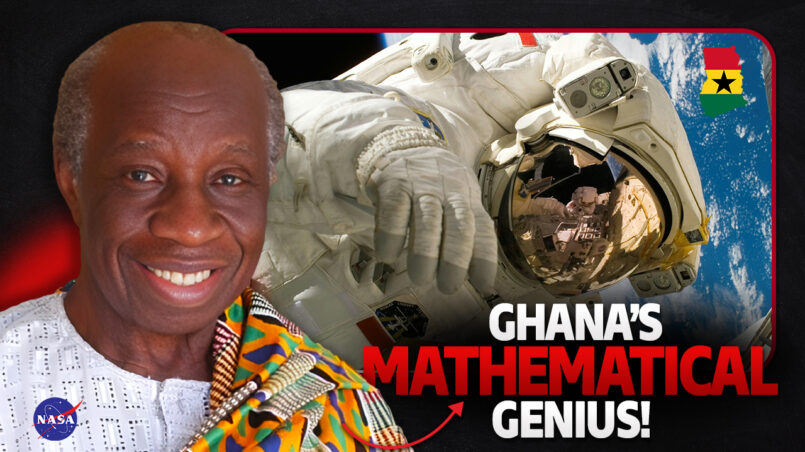Introduction
Prof. Francis Kofi Allotey stands as one of the most brilliant mathematical physicists Ghana has ever produced. His remarkable achievements, which we will explore in this video, are inspiring. This video is part of a series on our channel that celebrates the sharpest minds among Ghanaians and the Black community worldwide.
Today, we look at the incredible story of Francis Kofi Allotey, who rose from humble beginnings in the town of Saltpond to developing a groundbreaking technique that would later be applied by NASA.
If you’re new to the channel, hit the subscribe button so you don’t miss any of our forthcoming videos.
Early Life and Education
Professor Allotey was born on August 9, 1932, in Saltpond, a town in Ghana’s Central Region. He was the son of Joseph Kofi Allotey, a merchant, and Alice Esi Nyena Allotey, a dressmaker from the Royal Dehyena family of Enyan Owomase and Ekumfi Edumafa. Prof. Allotey was raised in the Roman Catholic faith and began his education at St. John the Baptist Catholic Boys’ School in Saltpond.
His father owned a bookstore and Allotey at a young age would help his father repack books when he closed from school. It was through this act that Allotey’s attention would be drawn to books about science. He would spend most of his free time reading the biographies of famous scientists who were explaining the universe like Einstein, Hubble, Eddington and others which heightened his interest in science.
In July 1948, he became part of the inaugural class of Ghana National College, a school established by Dr. Kwame Nkrumah. After completing his studies at Ghana National College, he left to pursue further studies at the University Tutorial College, London Borough Polytechnic, now called South Bank University, and London Imperial College of Science and Technology where he obtained the then coveted Diploma of Imperial College in 1960. He then went to Princeton University (USA), to study Mathematical Physics for his PhD.
Despite the allure of staying in Europe after achieving such academic success, Professor Allotey chose to return to Ghana. He taught mathematics for two years at the Kwame Nkrumah University of Science and Technology.
Career and Achievements
Prof. Francis Allotey held various leadership positions for the Ghana Atomic Energy Commission, the Council for Scientific and Industrial Research, the Ghana Academy of Arts and Sciences, the Mathematical Association of Ghana, the Ghana Institute of Physics, the International Union of Pure and Applied Physics, the African Institute for Mathematical Sciences, the African Academy of Sciences and played a key role in establishing the University of Energy and Natural Resources in the Brong Ahafo Region now Bono Region.
He was a Chartered IT Professional Fellow of the British Computer Society and Honorary Fellow of the UK Institute of Physics
He became the first Ghanaian Full Professor in Mathematics in 1973 at KNUST. He was ultimately appointed as the Pro-Vice Chancellor of the university in 1978. He dedicated his career to promoting mathematics, physics, and computer sciences in Ghana and across Africa. He collaborated with mathematicians from Imperial College London to establish a network of math researchers in developing countries.
Professor Allotey postulated what has now become known as “Allotey Formalism Theory”. Allotey Formalism is the technique used to determine matter in outer space. Science was extremely important to him, and he saw it as an essential means of meeting society’s needs for food, water, transport, communication, a good environment, health care, safety, and alleviation of poverty.
Passion for Science and Africa’s Development
When Professor Allotey was asked about his passion for promoting the study of mathematics and physics in Africa, he credited Professor Abdus Salam, who taught him math and physics at Imperial College. Abdus Salam was a Pakistani theoretical physicist and the first scientist from an Islamic country to receive a Nobel Prize.
Recognizing Allotey’s leadership potential, Salam encouraged him to spearhead scientific initiatives in Ghana and across Africa. As a result, Allotey was appointed to lead Africa’s work on the Scientific Council of the Abdus Salam International Centre for Theoretical Physics, a role he served in for 20 years.
Allotey firmly believed that empowering Africa through science and technology was essential for the continent’s development, as modern progress is driven by scientific advancements.
Awards and Honors
In 1973, he received the Prince Philip Gold Medal Award. In 2004, he was the only African among the 100 most eminent physicists and mathematicians in the world to be cited in a book titled, “One Hundred Reasons to Be a Scientist”. He was honored with the Millennium Excellence Award for Science and Environment in 2005. He received the Order of the Volta which is one of Ghana’s highest honors and was subsequently awarded the Osagyefo Kwame Nkrumah African Genius Award in 2017. The government of Ghana issued a postage stamp featuring his portrait. He was the Chairman of the Board of Trustees of the Accra Institute of Technology, the President of the African Institute for Mathematical Sciences, an honorary fellow of the Institute of Physics, and an Honorary Fellow of the Nigerian Mathematical Society among others.
Death and Lasting Legacy
On November 2, 2017, Francis Allotey passed away at the age of 85 of natural causes. The Ghanaian government accorded him a state funeral in recognition of his contributions to the advancement of Science and Technology in Ghana.
Conclusion and Call to Action
Although Professor Allotey is no longer with us, his groundbreaking formula remains a foundational tool for understanding chemical reactions among its many other applications.

